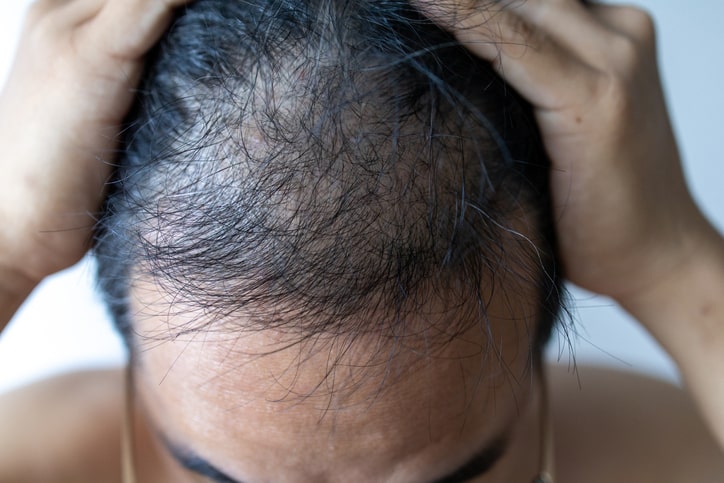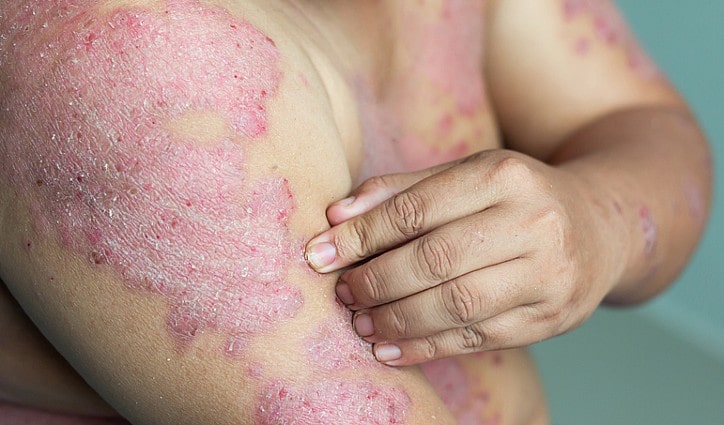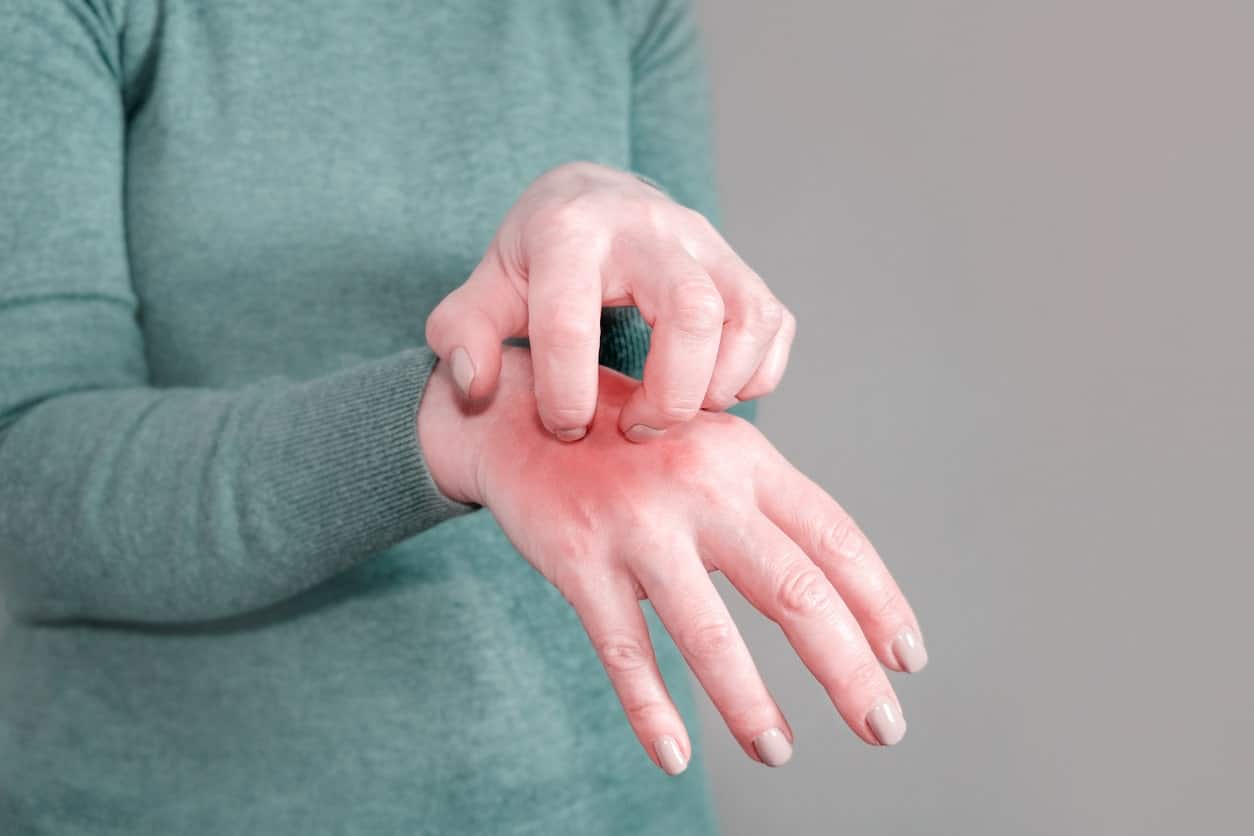Keep flaky and itchy ears away - when not treated, ear eczema can drastically affect your quality of life.
When we think of eczema, we often think of red and itchy skin on larger parts of the body. Often neglected is ear eczema, an eczema that affects the ear. It can strike outside the ear canal or the inside of the ear.
While our ears are just a small part of our body, the symptoms can be mild or so severe that they cannot be ignored. When it is severe, it can be downright painful.
How does ear eczema act up?
When ear eczema is aggressive it can attack:
- The opening of the ear
- Ear lobes
- Ear canal
- Conchal bowl
- Eardrums
- Ear folds (that's where your ear meets your face)
- Back of the ears
As you may have noticed, no part of the ear is spared.
Are there different types of eczema that affect the ear?
Yes, and they are;
Asteatotic Eczema
This type of eczema usually gets worse if:
- You shower too often.
- You are in air-conditioning for long periods of time
- You have central heating.
- There is cold, windy weather
- Your house has low humidity
If you have asteatotic eczema, your ears usually look dry and scaly and are pretty itchy as well.
Seniors are usually affected more than any other group.
Atopic Eczema
Atopic eczema usually strikes in that spot between your face and ear lobe, but it can spread to your outer ear (pinna) and down into your ear canal. Red, dry, itchy skin is its trademark. You may also develop painful cracks. What is truly concerning about atopic eczema is that if you scratch it, your skin can become infected.
Seborrhoeic Eczema (Dermatitis)
Sebborhoeic dermatitis usually affects several parts of the body (face, neck, scalp, torso) including your ears. Symptoms you can expect are redness, skin scaling, and cracks in the folds of the ear depending on how bad it gets.

Contact Dermatitis
Allergic contact dermatitis causes your ears to react with what you come into contact with, the allergen you are allergic to. Upon contact, your ears can become dry, red, and itchy.
The list of substances that trigger allergic contact dermatitis is quite extensive1.
The list below is not comprehensive but it's a good start:
- Topical medications
- Soaps
- Perfumes
- Makeup
- Nail polish
- Poison ivy
- Oak
- Spectacles
- Hearing aids
- Earphones
- Earplugs
- Mobile phones
- IPods
- Earrings
- Conditioner
- Shampoos
- Hair gels
- Hairpins
- Perm/hair relaxer solutions
- Hairnets
- Bath caps
It all depends on what these items are made of. The usual culprits are certain types of metal like nickel and plastic. You may also be allergic to the chemicals in cosmetic and hair products - so the key is to identify your triggers.
Can ear piercings cause ear eczema?
This is a common question I receive. The good news is that piercings don't cause ear eczema. So, if you are thinking of getting another piercing, you can!
The problem is the type of earring or stud you use. Generally, nickel, rolled gold, gold-plated materials, white gold and foreign silver are common allergic-causing materials. Your best bets are earrings and studs made of:
·Platinum
·Hypo-allergic jewelry
·18-carat gold
·Pure sterling silver
·High-quality stainless steel
I recommend that you get your ears pierced by a professional. After which, ensure proper aftercare by using a mild antiseptic solution at least twice a day until your piercing heals.
What are my treatment options for ear eczema?
Naturally, your treatment will depend on the kind of eczema you have and its triggers. If you experience any of the symptoms mentioned above, you should see your doctor so that you can get a proper diagnosis.
Treatments for Atopic, Seborrheic, and Atopic Eczema
There are 2 options that can be used interchangeably or together:
- Medicated emollient
- Topical steroid (usually prescribed for the severely affected areas behind ears and folds)
In the case of seborrheic dermatitis, an antifungal might be prescribed with your topical steroid.
Simply apply it gently to your outer ear with a cotton bud. DO NOT try to push the cotton bud into your ear canal. Steroid drops will be prescribed by your doctor.
Ear eczema tends to be a condition that is sort of like a boomerang - it keeps coming back. However, once you have the right treatment you will have it in check in no time.
Does ear eczema cause ear infections?
Sometimes, the affected skin may become infected by bacteria. This usually happens if the skin is broken due to dryness or scratching. I know that the urge to itch can be hard to resist, but try your best not to!
Eczema has been listed as one of the causes of Otitis externa (swimmer’s ear), which is inflammation of the ear.
Infected ear eczema can cause ear blockages and sometimes affect your hearing. It's caused by the increased production of wax and skin scales in your ear canal.
Ear infection and infected ear eczema can be brought on by moisture that remains too long on the ears. Swimmers usually have this problem.
Another cause of ear infections is the use of hearing aids and earpieces that do not fit comfortably. You should always choose devices that fit properly over those that look great.
What are signs that my ear eczema has caused my ear infection?
If your ear eczema has resulted in an ear infection, it's going to be hard to miss. Here are some of the tell-tale signs that scream that you're in trouble:
- Earache
- Itching
- Redness
- Weeping
- Green or yellow discharge
- Unpleasant smell
- Swelling
If any of the above are your symptoms, it's time to make a doctor's appointment ASAP. You also need to know a clear discharge is no cause for alarm, that just means that you have weepy eczema.
What should I do if I really have an ear eczema infection?
You should go see your doctor. Infections are nothing to be flippant with.
Bacterial infections will be treated with topical and antibiotic steroids.
Fungal infections will be treated with topical and antifungal steroids.
Please take your entire prescribed course of treatment. This way you get the maximum benefit from your meds.
Why are my ears itching and how can I stop it?
If you have itchy ears, it could mean that you have:
- An infection (Your ears may feel wet inside because of the pus present in the ear)
- Contact dermatitis
- Psoriasis
- Eczema
- An allergy
Please see a doctor. Once your doctor has determined the cause of your itching —whether it is eczema or infection— he will prescribe your treatment accordingly. Most likely you will be prescribed a mild steroid drop.
Is ear eczema dangerous?
While ear eczema can be exasperating, it is certainly not life-threatening. However, if infection sets in due to scratching, symptoms can get quite severe. The good news is proper treatment usually clears it right up with zero lingering effects.
Will my doctor clean my ear at my appointment?
If you have ear wax build-up and flaky skin inside your ear canal, your doctor will recommend you get it cleaned to prevent infection.
This is usually done via a technique called microsuction, which involves a mini vacuum and a microscope.
Microsuction is considered the safest earwax removal technique since your doctor is able to locate the blockage or build-up using a microscope and then remove it with a small suction tool. If all of the debris is not removed in one session, a follow-up session can be scheduled.
The collected debris in the ear is safely removed with little to no discomfort. If you suffer from ear eczema it is recommended that you have a routine aural toilet to prevent wax build-up and eczema debris.
Microsuction is considered superior to other ear wax removal techniques2 like irrigation which may put you at risk for infection and may be painful.
How should I take care of my ears?
Here are some ear care tips from our doctors.
- Gently clean your outer ear with water or an emollient wash
- Use a wet cotton bud to gently clean the bowl-like area of your ear.
- Never insert a cotton bud into your ear.
- Never try to wash inside your ear since this may cause damage to the ear canal lining.
- Dry your ear with a hairdryer on a low setting.
- Don't scratch inside your ear with hairpins or matches, they can cause damage to your ear canal lining or eardrum. Or even cause an allergic reaction.
- Don't use ear candles since there is no proof that they work, and they can even cause damage.
- Use earplugs to keep water out of your ear when swimming.
- Get a fitting for a comfortable hearing aid at a clinic.
- Use emollient creams on your ears to fight skin dryness.
- Use olive oil to soften your earwax.
- Stay away from water and earwax softeners since that can cause irritation and inflammation.
There is no doubt that ear eczema can be challenging and sometimes it is difficult to know what is going on in your ear without a thorough examination.
We encourage you to seek medical attention in Singapore if you are experiencing unpleasant symptoms. This way you will be accurately assessed and receive the appropriate treatment. You don't have to suffer needlessly with ear eczema.
References
- Raveendran R. Immunol Allergy Clin North Am. 2019 Nov;39(4):521-533. doi: 10.1016/j.iac.2019.07.006. Epub 2019 Aug 31. PMID: 31563186
- Hasson R, McDermott E, Hanley K, Carroll C, Collins C. BJGP Open. 2019 Jul 23;3(2):bjgpopen19X101649. doi: 10.3399/bjgpopen19X101649. Print 2019 Jul. PMID: 31366680
This article was written and medically reviewed by Dr Ben, M.D on 25/11/21








